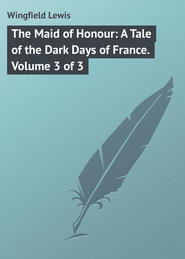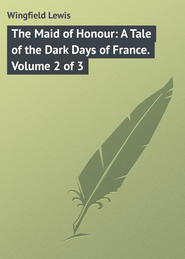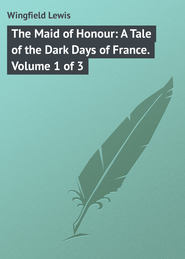По всем вопросам обращайтесь на: info@litportal.ru
(©) 2003-2024.
✖
My Lords of Strogue. Volume 2 of 3
Настройки чтения
Размер шрифта
Высота строк
Поля
'Both boys out, then? so much the better,' gaily quoth the chancellor, who chose for a moment to ignore Terence's mysterious absence. 'I hope Terence is safe; I can assure you Shane is; I saw him not an hour since. He roystered with the Blasters all night, and of course had to fight a duel in the morning. Is not the motto of their gay society "Nemo me impune lacessit"? But he didn't get a scratch-indeed he's a splendid swordsman-such a tactician-so sharp and quick of eye! I must really congratulate him when he comes in by-and-by. Those spiral stairs? Ah! That's the armoury.'
Phil dropped his flies, and leapt up from his seat. My lady and her guest, taking no heed of him, climbed upward, opened the armoury-door, went in and shut it. He could hear the creaking of their feet above. What could he do? Nothing! He sank panting on his seat, bewildered-then, stealing out, made the best of his way to the shebeen.
'By-the-bye, where is Terence?' asked Lord Clare. 'You don't know? I do. My poor old friend, prepare yourself for a shock. Sit down.'
With a gentleness which would have astonished his numerous enemies, the chancellor laid his two hands on my lady's shoulders and pressed her into a seat. The pupils of her eyes assumed that look, as of a startled hare, which shone in them sometimes. She sat down silently and waited.
Had Terence been guilty of something base? That was her first thought, in which there was a touch of remorse. Then came a feeling of anger in that he existed at all. Oh that he had never been born, or had died in his early childhood! This in its turn was followed by intense self-loathing; but her face remained immovable, while she looked up with inquiring gaze.
'I have most unpleasant news for you,' said Lord Clare kindly, for he liked my lady better than any one except himself, 'and thought it would come best to you from me. For we'll hush the matter up-rest easy on that score, trusting that no worse may come of it. Terence, as you know, was rude to me at Crow Street, t'other day. I didn't mind his petulance, of course; but for your sake I was hurt that he should have gone astray and made an exhibition of himself in public. It's your rough diamond Curran's fault, with his romantic balderdash about his country. He threw the young man into dangerous society, forgetting that it takes a seasoned head to weigh the hollowness of enthusiasm. Terence has been bitten by the prevailing rabies; the fever's hot upon him, and being of a higher breed than his companions, has rushed straightway into action, instead of merely prating like the others. As his mother, you should have greater influence over him than any one. Argue him out of his dangerous course. You think he's at Cork on law business? He's strutting up and down the landing-stage at Brest, with Tone and Hoche, and all the rest of the jays in peacock-plumes. He's urging the bevy of juvenile generals there to come across the water, despite the lateness of the season; in fact, he's beginning the risky game which brought Balmerino, Kilmarnock, Lovat, to the block. I'm sure of what I state-trust me for that. Why! these hot-pated fools do nothing that we're not informed of; and Mr. Pitt's staff in France is every whit as sharp as ours here. Do you desire a proof that I speak with authority? What are these things stacked here, under these cloths, within these presses, even piled, as you see, right up the chimney!' Lord Clare moved about the room with the precision of one who is sure of what he does. 'Pikeheads, my lady-rough but efficient-which are to rip his Majesty's soldiers when the struggle shall begin. It was an ingenious notion to store them under the roof of a known loyalist. Who placed them here? Your ingenuous boy, Terence, with the assistance of the people at the shebeen below. That "Irish Slave," by the way, must have a visit from us; also the fair dame on whose ground it stands. Look at this paper. A design for a pikehead, precisely like these, with written directions-in whose hand? Terence's! I gave five hundred guineas for that piece of paper. See! do not tremble-it's destroyed-the evidence is gone.'
My lady sat upright in her chair without moving, staring up at the speaker, scarcely comprehending what he said, through the singing in her ears. Terence, her son, had actually joined the disaffected-these deluded persons whose proceedings shocked all her prejudices-whom she sincerely believed were only fit for Bedlam. He might come to an ignominious death unless she put forth all her influence to drag him from the danger. What influence could she expect to have? Whose fault was it that she had none? Her sin was finding her out in an unexpected fashion. A great cry rose up within her, that her fortitude was near its end. It broke from her bosom in a sigh of weariness. She looked old and haggard as she stared up at the chancellor. Her ancient friends poke of the situation: of how the commander-in-chief my Lord Carhampton must inaugurate a new régime, now that martial law was declared; of how, all things considered, in the complications which were arising, it would be wise for the denizens of the Abbey to depart shortly. Terence might be expected back in a day or two; then his mother must speak to him and take him with her if she could. It would be well to take Miss Wolfe away too, as she was playing the fool most egregiously. She, too, had a hand in this pike-stacking.
My Lord Clare laughed in his disagreeable manner as he recounted how he had succeeded in terrifying poor vacillating Arthur Wolfe about her. At all events it was most wise that Lord Glandore should go; for it would be a terrible thing-supposing Terence proved obstinate-if the brothers should come to be in rival camps upon the scene of action.
'My dear lady,' he concluded, 'we shall have a hot time of it before we've done, I do assure you. Take your measures as I advise. Now I must be off to turn the screw upon the "Irish Slave."'
The coach rolled citywards. My lady, face to face with a new trouble, clung to the one speck of brightness which glittered like a star. Gillin certainly was committing herself. There was to be a search upon her premises. Her ruin would surely follow. The pressure from that side would be removed. Thank heaven for that! Yes! This was a real ray of light shining from out the gloom. Things at their worst must mend. With firm step the countess swept along the passages, striving to stifle the remorse which whispered that if evil came to Terence, she would be responsible. She would follow her friend's sage advice to the letter, she determined. It was time to do battle with Doreen, as to her proposed visit to the north.
Miss Wolfe was bending over the sun-dial in her little flower-plot, which was sad-looking with quaint-toned chrysanthemums, her head bowed upon her arms-a statue of despair. An open letter lay crumpled at her feet. My lady saw it and smiled grimly. Indeed, the poor maiden had received a terrible blow-one heavy enough to stagger even her firmly-knit nature. The beauteous Château en Irlande, which she had been so busy building, had come crashing down. Its gargoyles and turrets were admirable to behold-but, alas! its foundations were of sand. It had toppled bodily upon her head, and she was stunned by the completeness of the ruin. Her fond parent had indited her a note bidding her pack up her clothes; for, that she might be removed from danger, she was to go to Glas-aitch-é with her aunt.
She was caught in her own trap. Those dainty visions of returning to her father, of weaning him from the flesh-pots, of bolstering him up in the buckram of her love against his weak sensual self, were vanished. 'She was to be taken away out of danger,' her cruel father wrote, as though she did not pant for danger as doth the war-horse! The misfortunes which might result from this unlooked-for arrangement rose up before her one by one, each armed with its separate shiver. The struggle would come. She, whose heart was wrapped in it-who had made up her mind in which direction duty lay-would be a prisoner far away in a desert island, to which news would trickle slowly: that was bad enough. But of late she had become morbidly anxious, on account of the disorganisation which delay was causing among the United Irishmen. It was only by her own personal influence that Russell and Bond had bowed to Tom Emmett's dictum, and consented to await Terence's return. Were the French coming, or were they not? If not, would the society fling down the gauntlet alone? If it should do so, what would be the result? Would Emmett continue to carry his point as to delay? If he failed in his endeavours, what could be expected to take place? Even if he should be able to control the unruly, how fraught with danger was the prospect. Help from France was the willow that bound the sticks; that band removed, with what ease might each separately be broken!
At sound of my lady's footstep, Doreen started from her crouching attitude. Her aunt's were the last eyes on earth which she would wish to pry into her despair. She was vaguely suspicious too that her aunt's wild projects of matrimony had something to do with this last arrangement. It was, beside the others, a mild phase of annoyance no doubt, but it certainly was annoying to consider that in Donegal she would find herself shut up well-nigh alone with Shane, who, urged by his mother, might tease her dreadfully. Taken altogether, her future looked black as Styx. She promised herself to make one effort more to remain behind in Dublin. Then it flashed upon her that perchance some one had warned her father of the prominence which she had assumed of late. Yet who would tell him? Her precautions were always well taken. In public she acted with extreme reserve towards Tom Emmett and the rest. Private interviews had always been held at obscure cottages, whose owners she knew would be hanged ere they betrayed her. There was no doubt though, she reflected with sore foreboding, that there were traitors somewhere. If only they could be unmasked. Well, well! time unravels many tangles.
'I see your father has written to you,' my lady said, stepping down into the garden. 'He must even defend you against yourself. Upon my word, the Irish are all insane. I shall have the honour to be your keeper for awhile-in a most impregnable asylum.'
Then it was her aunt who had suggested this step. At this instant how bitterly she hated her!
'I have yet to learn,' she said with hauteur, 'what business you have to interfere with me. I am of age, and not your daughter.'
'You will not presume to disobey your father, I suppose?' the countess inquired coldly. 'Though I ought rather to be surprised if for once you are dutiful.'
'My duty is to my mother's people!' Doreen murmured absently.
'I told you once before,' her aunt went on, unheeding, 'that you would disgrace the family and break your father's heart. For both reasons it is my distinct business to interfere with you. The friends whom you have chosen to make, are rushing like sheep to the slaughter. You shall not be one of the flock if I can help it. I have spoken gravely to your father about you; and so has some one else-Lord Clare.'
'Lord Clare!' echoed Doreen, astonished. 'What does he know about me?'
'Too much,' retorted her aunt, dryly. 'He showed me, just now, a delectable sight in the armoury, a discovery which cost him five hundred guineas. For shame! It is kindness to deem you mad.'
'How did he know of the pikes?' startled Doreen inquired.
'Through Terence,' replied my lady, shortly-for she knew not how much or how little her niece and son were mixed up in this affair, and always instinctively avoided talking of the latter to the former. There was a long pause, during which the dowager continued to eye her niece.
'Aunt, I will go with you to Donegal!' Miss Wolfe said slowly, her large eyes peering with vague terror into space. 'I think now I will take a walk, for I am rather upset;' and quietly taking her garden-hat from the bench hard-by, she knotted its ribbons under her chin, and disappeared between the beech hedges of the rosary.
There are moments in most lives when so sharp a pang shoots through our hearts, that we feel there is nothing left but to seek a remote covert and wait for death. Such strokes age us suddenly and surely. To few is it given to become old by slow and imperceptible steps. We remain in the solitude of our covert without speech; almost without feeling. Presently we perceive that we were mistaken about death (for the White Pilgrim comes not for the bidding); and emerge into the world again, apparently the same as before-young outwardly, and smooth-browed, but really altogether different. Poets have sung much of broken hearts, at which cynics have scoffed, time out of mind. Hearts have broken under a sudden mental shock, but seldom. They are more usually turned inside out and changed.
Doreen had just received such a shock as calls imperatively for solitude. Then the snake in the grass-the Judas-was Terence-her own cousin! Rapidly she walked through the rosary, and out by the wooden gate into the open-away-inland across the fields, for miles.
She was surprised to find that she felt more grieved than was at all necessary, in that the snake was Terence. Only a few minutes ago she had been praying heaven to unmask the villain, with the laudable intention of pointing him out to the reprobation and contempt of the society. But Terence! The open-visaged, careless youth who exasperated her, as a woman, chiefly because he was prodigal of promise which was not likely to be fulfilled. He had been so importunate in blundering puppy fashion (really almost as ridiculous as Cassidy), heaving absurd sighs, carrying on his intermittent wooing in so ludicrously naïve a manner, as to provoke scorn in so high-spirited a mistress. Looking within herself, she discovered that behind her light estimate of his amatory ravings there was a genuine liking for the lad. Could she have been entirely mistaken in him? Could her judgment have been utterly at fault when she decided, that if feebly endowed by nature, he was at least honest and true? For the more she considered the subject as she trudged across country, the more she felt that it would be indeed grievous if that fine open face, which had looked so noble in its indignation on account of the martyr Orr, should turn out to be only a grinning mask.
Terence the Judas-the betrayer of the innocent-the snarer of the unwary! Terence, her cousin, whose jocund visage she admitted to be rather dear to her. If he proved so base a scoundrel, in whom then might an earnest soul place trust? Was his perfidy a fall, or original sin? She remembered how she had read wise thoughts in books, wherein sages had explained that our nature is unstable, liable to trip-that none can resist temptation if clothed in the fittest garb. Is not the prayer which should be oftenest on our lips, 'Lead us not, O God, into temptation?' Women are perverse, choosing always the left one, when they ought to take the right turning; and with the perversity of women Doreen chose at once to accept the most distasteful phase of the situation. She took it for granted that Terence was in the wrong, instead of more prudently suspending her judgment till his return from France.
The feet of her cousin were cloven. He wore a tail and smelt of brimstone. She stood still beside a paling as she thought of him, and shook it in a rage with both her hands, while a vague feeling of uneasiness came over her in that she should care so much that Terence should prove the Judas. Yet was she not quite justified in her dismay? Was it not natural that her faith in truth and goodness should be thrown out of gear by such low calculating turpitude? Clutching the gnarled paling, the unhappy lady bowed her face on it and burst into sobs which shook her to the centre.
Five hundred guineas! That was the sharpest of the many thongs which smote her. She had declined to look at the sordid motive-it was so very mean and vile. But now it clamoured with open palms at the gates of her brain, and shouted deafeningly. Vulgar money troubles are at the bottom of everything that's base! What a pity that there should be such a thing as money! Five hundred guineas! How small-how miserable a sum! He was always in debt, she knew: to such easy-going creatures as he always seemed to be, debt was a state of nature. But could he have sunk so low as this? Was he capable, for five hundred guineas, of suddenly assuming a noble love of motherland, which was a farce-of laying a gin for the feet of persons who had never injured him-nay, whom he reckoned among his dearest friends? For the wretched price of five hundred guineas, could he look her-his cousin, almost his sister-in the face, and endeavour to steal her heart, that he might stick it on a pole for the amusement of fellow-traitors? Traitor! Arch-traitor-wretch! Tears having come to her relief, Doreen sat on the grass and wept, and felt like the wounded beast within the covert.
Piecing scraps together, with the key which my lady had furnished, many cloudy matters became clear. My lady was proud and prejudiced, but her pride revolted against treachery. If not, why had she suddenly warned her niece to see that her correspondence was not tampered with? Who should tamper with it? Not Jug, or Biddy, or Phil. They were children of the soil, who knew not treachery. How could my lady know of any tampering of theirs? No! It was against Terence-the son whom my lady loved not-whose unworthy proceedings filled her aristocratic soul with repugnance-that she had warned her niece. Lord Clare knew the very wording of Theobald's last letter-through whom? Through Terence, of course-for five hundred guineas-alas! alas!
All of a sudden a new idea struck Doreen, and she sat up, her cheeks blanched and tear-stained. The traitor had worked well for the degrading pittance. He had succeeded in hoodwinking the society as well as herself. He was now at Brest, with every secret in his possession-every detail-every aspiration-cut and dried-in cold black and white-and she it was who had despatched him. The Emmetts, Russell, Bond, were doomed men. Their young lives were unconsciously sacrificed by her. There was no end to the blood for which she would be answerable. The cycle of her frenzied thoughts came back to the point at which she started. She had been trifling like some innocent child with burning brands which had scorched her. Not herself alone. Her life was her own, for better or for worse. When she should be called to appear before the throne to account for her deeds, she would be asked, 'Why broke you your father's heart for a chimera? why did you lead Emmett, Russell, Bond, by your wiles to the scaffold? Who were you to set yourself up as a teacher? To lure honest men, like a siren, to destruction? What could her faltering answer be? I meant well. I acted for the best. I was presumptuous. I am sorry… Can regret undo the injuries which are due to our presumption? No. The wretched Doreen was crushed by an overwhelming sense of her own littleness and failure. There was nothing for it but to kneel down and cry, 'I have sinned;' to clasp her sorrow and take it to the north, there to hold vigils of unfruitful repentance, whilst praying humbly to be released from earth. The wilds of Glas-aitch-é should be her covert. Into it she would creep like a stricken doe. If the White Pilgrim would obey her summons, with what gratitude she would cling to his filmy raiment! If he refused to hearken to her pleading-why then she must, kneeling on the stones, endure unto the end with such meekness as a vengeful heaven might vouchsafe to her.
The wild paroxysm past, she got up and returned with trailing feet towards the Abbey. Her limbs were aching from contact with dank herbage: her brogues and stockings soiled with clinging mud. A drizzling veil was settling on the earth, which looked, as far as ken might reach, dun-toned and colourless. Raising dazed eyes, she beheld a slim figure moving with rapid strides, and recognised young Robert from afar.
What could he be doing? Was he also crushed in spirit, as weary of the world as she; wandering in search of peace? or on one of his many missions of private charity?
He had been to the Abbey in quest of her; was told by a garden-lad that she had passed through the wooden postern, and had tracked her wanderings from hut to hut.
'They are going too far!' he said abruptly, with bent brows, as he turned to walk back with her. 'Already the squireens are abroad, imitating their fellows in the north. Dublin's in a ferment. It needs but the coming of the French to settle the affair at a blow. Every magistrate has received orders to raise twenty men to preserve the peace in place of the militia, should these be ordered to the coast. But they overreach themselves. Decent people are so furious at the tactics of Lord Clare, that even the militia are dying to turn against the Government. Cassidy says so, who should know, seeing that he keeps up a friendship with the Castle. I speak to-night at the Debating Club. Look at these notes,' he added, smiling. '"Recipe to make a Rebel! Take one loyal subject uninfluenced by pension; burn his house over his head; murder his wife and babes before his eyes; march away with such plunder as you choose to save from the flames-" But what is the matter? You look ill!'
'I am leaving Dublin almost at once,' Doreen said, 'and am glad of it. If there is one power which has the gift of withering up the soul, it is treachery! I am sick of the world. Go to your brother. Tell him the cause is lost. One who held all their secrets has betrayed them-for five hundred guineas; that is their value in his eyes.'
Here the girl broke into wild laughter-she who never laughed; and Robert looked at her in surprise, with a sense of coldness, creeping. Then, with a hectic spot upon each cheek, she eased her breast with words; recounted all she knew, and much more which was conjecture, though in her perturbed state she was not aware of it. Explained that they were all dupes of Terence's false bonhomie-that he had coldly and deliberately played a part; had, as it were, eaten their bread and salt, and then stabbed them in the back. In the midst of the hideous recital, her voice choked in a great gulp, and clasping her hot face with her hands, she burst into a flood of tears.
Ardent young Robert was shocked, but not convinced. Terence! whom every one loved for his bright eyes, through which shone forth an honest soul. To whom Robert and fellow-undergraduates looked up as to a preux chevalier in the matter of grouse-shooting and the beguiling of the wily trout. He could not believe such a thing, and would not. Lord Clare was capable of any amount of lying. His ways were so tortuous that they were difficult to follow. His spies were legion, who ferreted out everything. No doubt Phil and Biddy had been watched; they had billed and cooed too loudly as they had handed the pikes over the wall. Terence was unduly heedless about money; his friends frequently declared that he didn't know its value. It was absolutely out of the question that he should suddenly be tempted to do so crafty and mean a thing. As for the delegates of the society being betrayed and their secrets known, there was nothing new in that. Had they not, months ago, been arrested at his own chambers, their papers seized, themselves arbitrarily imprisoned, and afterwards as arbitrarily released? He could not fathom the tactics of the executive, the youth was forced to confess, for their movements seemed planned to circumvent each other. The rank and file were being captured by dozens and hanged, while the commanders and organisers of the scheme were permitted to remain at large.
It was not unpleasing to Doreen to hear her cousin defended; but she shook her head.
'If the French were to come now,' she said, 'they might set things right; but then they must come in force; and Terence, having gone to Brest, would probably clinch the irresolution of Hoche, and effectually decide him not to come at all. Verily, the world and its affairs were vexation of spirit; conspiracy a disheartening game; Ireland an accursed land, foredoomed to eternal misery.'
By the wooden postern which gave access to the rosary, stood a group of peasants, who humbly bowed to Miss Wolfe, then returned to the dirge of lamentation which her appearance had interrupted.
'Jug Coyle, what is the matter?' Doreen inquired; for she recognised in a heaving heap before her the shattered remains of that lady.
'Whisht! acushla!' a man whispered. 'Let her tears flow. Sure she's burned out of house and home. Her cabin's desthroyed. The sodgers-bad luck to 'em! – have taken her bit of bacon and the dhrop of potteen the quality used to loike, and thin they began to turn up the pratey-garden, and Biddy gave a yelp and wanted to run to the Little House, but the blagyards gagged her mouth with an ould rag, and tuk her away screeching.'
'The "Irish Slave" destroyed?' inquired Robert.
'Yes, your honour,' replied the man, lowering his voice as he glanced around. 'But they didn't find much. Phil, Masther Terence's man, came down from the Abbey to give the office, and most of the pike-heads were tossed over the wall, till we can put 'em back to-night. Wake up, Jug, and spake with the lady. Sure the shock has druv the collough crazy. When the thatch was all ablaze we went up to Madam Gillin, who always has the kind word and bit and sup; but she said she could do nothing, and bade us come to you.'
'To me!' echoed Doreen, bitterly. 'Am I not too a Catholic, and helpless?'
'But it's your father's the great gintleman,' urged the fellow coaxingly, as he twisted his corbeen between his horny hands. 'If ye'd spake the word, acushla-'
'My father!' Doreen groaned, breaking abruptly through the knot of suppliants. 'What can he do? He is sending me away. I'll pray to God for you; but He has been deaf this long while.'
CHAPTER IV.











